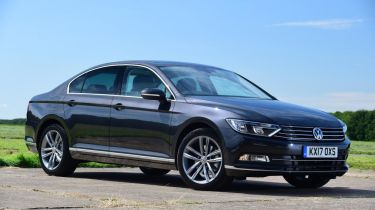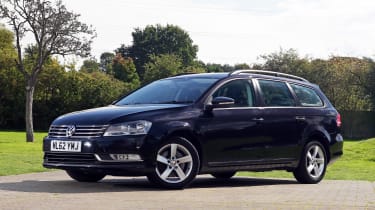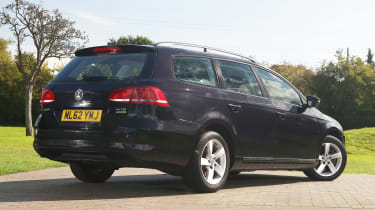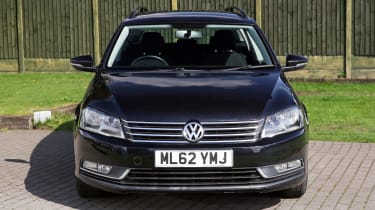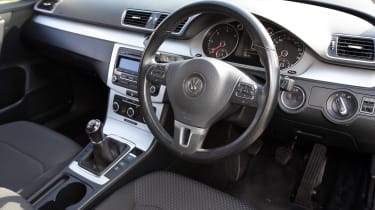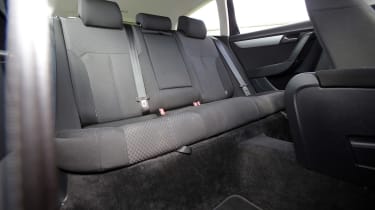Used Volkswagen Passat (Mk7, 2010-2014) review
A full used buyer’s guide on the Volkswagen Passat covering the Passat Mk7 (2010-2015) and Passat Mk8 (2015-date)
family cars are more polished than the Mk7 Volkswagen Passat. This model has it all: cutting-edge safety features, a spacious cabin, lots of equipment and excellent build quality.
But the sober design inside and out means the VW has a dowdy reputation, which isn’t entirely deserved. Add keen prices into the mix and you can see why the Passat makes a great used buy.
Sure, you’ll pay more than you would for an equivalent Vauxhall Insignia or Ford Mondeo, but we’d argue that the Passat is more well rounded than either of those less premium alternatives.
Here we guide you through what is on offer and what to look out for.
Volkswagen Passat Mk7
History
The Passat Mk7 that arrived in October 2010 was heavily based on the Passat Mk6, introduced in 2005. At launch there were saloons and estates, in S, SE or Sport trims. Petrol fans could choose between 122PS (120bhp) 1.4 TSI and 160PS (158bhp) 1.8 TSI engines, while there were 105PS (104bhp) 1.6 TDI and 140PS (138bhp) or 170PS (168bhp) 2.0 TDI diesels. All versions were available with either a manual transmission or a DSG automatic gearbox.
Highline trim replaced SE in October 2012, and a 158bhp 1.4 TSI engine took over from the 1.8 TSI unit in May 2013, when an R-Line trim option also arrived. Executive and Executive Style specs arrived in January 2014, the former replacing the Highline. An all-new Passat reached the UK in October 2014.
Volkswagen Passat Mk7 reviews
- Volkswagen Passat in-depth review
- Volkswagen Passat 1.6 TDI BlueMotion review
- Volkswagen Passat Estate in-depth reviewV
- olkswagen Passat Estate Highline 2.0 TDI review
- Volkswagen Passat Alltrack 2.0 TDI review
Which one should I buy?
The TDI diesels are smooth, torquey, refined and frugal, and while the TSI engines are also excellent, they’re extremely rare. Autos are plentiful and the DSG is a superb transmission, if not usually as reliable as the manual box once a high mileage has been racked up. All Passats come with alloy wheels, ESP, curtain airbags, climate control, electric windows all round, USB input, plus an eight-speaker stereo system.
SE adds DAB radio, cruise control, Bluetooth, an electrically adjustable driver’s seat plus automatic wipers, while Sport comes with privacy glass, sports suspension and seats, plus tyre pressure monitoring. Highline models feature parking sensors all round, the R-Line has a bodykit and xenon lights, while the Executive gets leather trim.
Alternatives to the Volkswagen Passat Mk7
The Passat sits between premium and volume, which is why the Audi A4 and Ford Mondeo are both rivals. Both come in saloon or estate forms, but only the Audi is offered with four-wheel drive. The Ford is more spacious, far more affordable and better equipped.
Used - available now

2021 Land Rover
Range Rover
27,750 milesAutomaticDiesel3.0L
Cash £49,995
2022 BMW
3 Series Touring
52,456 milesAutomaticDiesel2.0L
Cash £23,800
2018 Mazda
6 Saloon
48,985 milesAutomaticPetrol2.0L
Cash £12,600
2023 Mercedes
EQC
55,207 milesAutomaticElectric
Cash £22,300The Honda Accord and Mazda 6 are reliable, stylish and come with some excellent engines, while the Skoda Superb is huge inside, dependable and well equipped. If your pockets are a little deeper you could also shortlist the BMW 3 Series and Mercedes C-Class; both are excellent, plentiful and come with a wide choice of engines and trims. If you like a bargain, look at the Hyundai i40, which is excellent value in comparison.
What to look for
Damage
Without sensors, parking a Passat can be a nightmare, so look out for scuffs and cracks on the bumpers.
Brake
All cars come with an electronic parking brake as standard, but it doesn’t always release as it should.
Electrics
Batteries can go flat because of a current drain, often caused by the radio. Finding an effective fix can be tricky.
Tyres
Premature and uneven tyre wear is common, especially with the standard Dunlop rubber. So check all the tread.
Interior
The Passat’s dashboard is conventionally designed; it’s a model of clarity and feels seriously durable, even if it’s far from exciting. Refinement is excellent, kit is generous, rear seat space is decent, and so is luggage capacity at 565 litres for the saloon and 603 litres for the estate – or 1,731 litres with the rear seats folded flat.
Running costs
The Passat has standard (12 months/9,300 miles) or long-life (two years/18,600 miles) service intervals, the latter using higher-quality oils. Maintenance alternates between minor (£164) and major (£329).
A new cambelt is needed every five years or after 130,000 miles on all diesels; the TSI petrol engines are chain-driven. Volkswagen dealers offer incentives for cars over three years old, which means a cambelt replacement costs £434 for all Mk7 Passats.
The brake fluid needs to be replaced (£59) and the air-con serviced (£79) every two years.
Recalls
The Mk7 Passat has been recalled once, for a potential leak from the high-pressure fuel pipes of the 2.0 TDI engine. The Golf, Tiguan, Scirocco, Eos and T5 Transporter were also affected, and 33,719 cars were recalled in total.
Some Passats were also caught up in the diesel emissions recall. Put the registration number into www.tinyurl.com/y7nhdtht to see if a car is affected.
Driver Power owner satisfaction
For a car that went on sale over seven years ago, 28th position in our Driver Power 2017 used car survey isn’t bad. Practicality is clearly the VW’s ace card with a 10th place, while economy, safety, infotainment and comfort received good scores. But 61st for reliability and 58th for ride and handling are disappointing.
Verdict
You won’t stand out if you drive a Passat, and you won’t be excited by it, but this is one polished performer. There are no poor choices when it comes to bodystyles, engines, transmissions or trims; all are great at what they do and are a safe bet as a used buy. Last year’s Driver Power used car satisfaction survey shows that the Passat is still desirable, but considering the often hefty asking prices, it should have done better. The VW lost marks for reliability and was beaten by the Ford Mondeo and Skoda Octavia. We still think it’s a great family car, but it’s clear that you need to buy with care.

